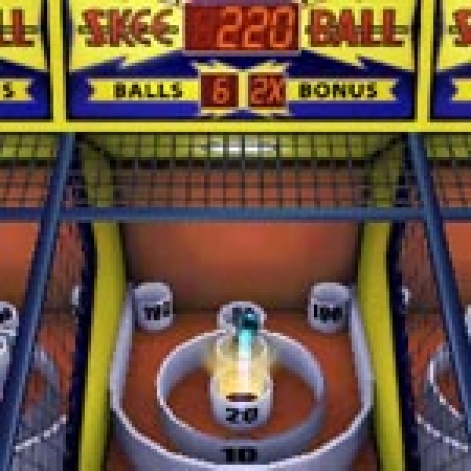Of course, this doesn't necessary mean these games are great, or even good in terms of the offered gameplay experience. Only that they encapsulate an important trend in the iPhone games business.
Previously, we counted down the most significant iPhone games from 10 to 6: from Terminator Salvation to Rolando 2.
Now it's time to get stuck into the real meat.
5. Skee-Ball (Graveck/Freeverse)

No game in 2009 better defined William Goldman's quote about the film industry that 'No one knows anything'. The remake of a previous flop called 10 Balls 7 Cups, Skee-Ball added features in the form of a virtual store and integration of the Plus+ social gaming networking, but the biggest change was the acquisition of the official Skee-Ball licence.
On release, the game didn't review particularly well, and has only been updated once since its late September debut, but has been massively successful, netting publisher Freeverse a reported $180,000 within a month of release, despite its 99c price tag.
So despite similar and better reviewed (if more expensive), games of this sort being available, Skee-Ball has remained a firm fixture in the US top 20. It ended the year in the #1 position, and proving that when an iPhone game resonances with its audience, it doesn't matter what the industry thinks.

4. Tap Tap Revenge 3 (Tapulous)
The fact that the latest game in the 20 million selling Tap Tap Revenge rhythm-action series has been a massive success doesn't come as a huge surprise. What is important however is the news that over one million tracks have been downloaded as in-app purchases since its October release, raising an estimated $350,000 in net revenue for the publisher.
For while many companies have been using the IAP mechanism, Tapulous has been the first to publicly reveal hard figures rather than talk anecdotally about success.

Of course, the music-centric format of the gameplay makes the in-app purchase of additional music tracks a virtual no-brainer. It will be much harder to replicate this success in more standard iPhone games, but if nothing else Tap Tap Revenge 3 - which is now available as a free game - will provide inspiration to others.
3. iBlast Moki (Godzilab)
The saddest tale has to be the old, old story of a game that glows with critics' praise and fails to make much of a dent commercially. In 2009, that game writ large was Godzilab's iBlast Moki.
All the websites loved it (Pocket Gamer slightly less than the others), but various factors meant it failed to find mass appeal.

Obviously neither the obscure name nor the inexperience of the small French development studio in terms of press and marketing helped in terms of spreading the word. These combined with a price of $1.99 meant the game didn't get launch traction.
Dropping the price to 99c three weeks later certainly did boost sales, gaining it top 10 status in the UK, German and Italian markets, but with a US peak of #51, iBlast Moki's failure to crack the most lucrative iPhone market (especially when compared to the likes of Skee-Ball), demonstrating something of the disadvantage of arty, indie developers operating outside that territory.
2. StoneLoops! of Jurassica (Codeminion/Playfirst)
The most surprising and the least well reported story of 2009 was the removal of Codeminion and Playfirst's StoneLoops! of Jurassica from the App Store.
To be honest, the whys and wherefores of the situation remain shrouded in some mystery, but what seems clear is that the game was taken off the App Store by Apple following a complaint from MumboJumbo, the publisher of a similar game Luxor.
Codeminion's side of the affair has been well documented in a post on the company's blog and to-date neither Apple or MumboJumbo have publicly commented on the circumstances.

Combined with the ongoing situation between Tim Langdell and various developers he believes to be infringing his copyrights however, it suggests Apple needs to be both more transparent and less immediately knee-jerk in the way it deals with complaints of this type.
What's particularly worrying in the case of StoneLoops! of Jurassica is it seems not to be about formally defined legal elements such as copyright or patents, but a general complaint about the look and feel of a rival (and more successful) game; a practice that if widely copied could result in the effective collapse of the App Store as a business place for small developers.
And the fact there's a fairly clear timeline in terms of the history of such marble-popping games - which predates both StoneLoops! of Jurassica and Luxor by many years - makes the whole episode even more embarrassing.
1. Call of Duty: World at War: Zombies (Ideaworks Game Studio/Activision)
The App Store has gone through several well defined waves. The launch period saw opportunistic Mac and mobile developers and publishers experimenting with the new platform, which was closely followed by a free-for-all as every mobile developer and garage start-up piled into the action.
The main trend through the second half of 2009 however has been the slowly tightening grip of EA Mobile and Gameloft when it comes to generating revenue; something underlined by the shock of Activision's (via its Vivendi Mobile division, and developer Ideaworks3D) top grossing game Call of Duty: World at War: Zombies.
Banking on a combination of brand transference thanks to simultaneous release with the new Call of Duty game, as well as the repurposing of existing content, and support for online play, World at War: Zombies demonstrated that with a bit of imagination and quality development work, big console licences could support a $9.99 price point and hence generate significant amounts of revenue. Released mid November, Call of Duty: World at War: Zombies has been at the top of the US Top Grossing chart ever since.
Expect every console and PC publisher to be considering which of its games it will be bringing to iPhone in 2010.
You can read about the most significant iPhone games of 2009 ranked 6 to 10 here.



















